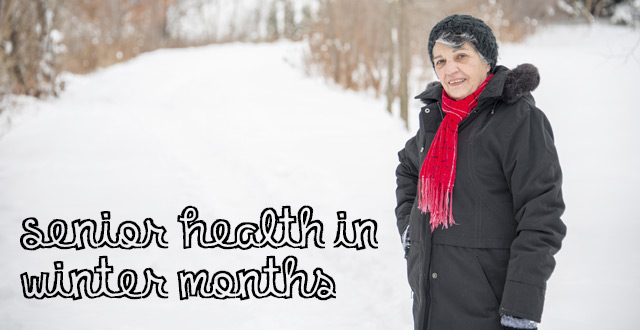The cold weather is among us and it is especially important for seniors to plan and prepare for the winter months ahead.
Some typical hazards that can happen in the winter months include falling on the ice and catching a cold or the influenza virus. Using common sense and being cautious can help prevent these winter safety issues.
Safety First
It’s important for seniors to avoid taking risks or making unhealthy choices when winter snow and ice arrive. Here are some tips to help you safely navigate the winter weather:
- If you are able, hire someone to shovel your driveway/sidewalk for you. If this isn’t an option and you plan on shoveling yourself, make sure to move small amounts of snow at a time and to take frequent breaks. If at any point during shoveling you feel heavy in the chest or dizzy, stop immediately and seek medical attention.
- Put together a winter safety kit to store in your car. Include items such as flashlights, extra batteries, matches, first-aid materials, food, and extra blankets.
- When making plans and traveling, be sure to tell someone when and where you are going. Always keep your cell phone with you.
- Stock up on extra non-perishable food items at home. In the event of a major storm closing down roads, having food reserves at home will relieve the stress of needing to go out.
Dodge the Germs
Winter is also known as cold and flu season. Precaution is the number one way to avoid getting sick during the winter months.
- Don’t over do it with the all the hustle and bustle of the season. Limit your holiday plans to a manageable amount and rest when you need to.
- Wash your hands often to remove the germs you pick up. Hand sanitizer is a convenient way to hand wash on-the-go. Stash a bottle or two in your purse and/or car.
- Our bodies immune systems start to weaken over the age of 65 so it is very important for seniors to get their flu shot. Flu shots are available at your doctor’s office, clinics, and some pharmacies. Medicare and most insurance companies will cover the cost of the vaccine.
- Eat healthy and increase the amount of fruits and vegetables in your diet. Added vitamins and minerals from the fruit and veggies will help your bodies immune system to better fight off germs.
- Keep properly hydrated. Avoid alcohol and caffeine because they will dehydrate your body. Drink plenty of water instead.
- Exercise regularly. It can be difficult with the winter temperatures to get outside and be active, but there are some other options available to help you stay physically fit. Join a health club or walk on an indoor track at a school or mall. There are also many at home exercise options to choose from.
Although the winter months hold their own unique challenges, there is no reason why you can’t fully enjoy the season. Take some extra time to plan and prepare, keep your body active, healthy and well rested, and don’t forget to use your common sense.

